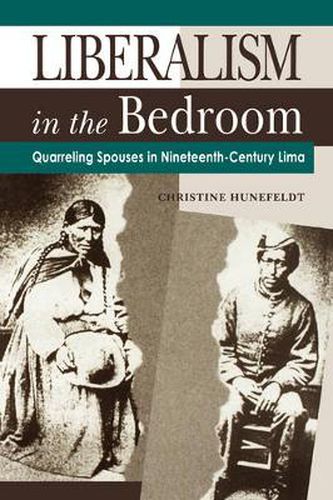Readings Newsletter
Become a Readings Member to make your shopping experience even easier.
Sign in or sign up for free!
You’re not far away from qualifying for FREE standard shipping within Australia
You’ve qualified for FREE standard shipping within Australia
The cart is loading…






This book tells the story of how ordinary Peruvian men and women experienced their lives and especially their marriages in a patriarchal society and how, through the struggles involved in divorce, women tried to defend their rights and in the process helped bring about change in society more broadly. Careful examination of more than one thousand cases of conjugal suits filed in Lima’s archbishopric, as well as wills in notarial records, allowed the author to trace over time quarreling spouses’ relationships, attitudes, and perceptions of gender, life cycle, race, and class and to study their evolving moral expectations and the varying pace of social change. The history of this marital dialogue reveals the contruction of a new terminology, based on liberal ideas imported from England and France, that found its way into domestic life and influenced how conflicts were perceived and resolved. Far from opening doors for women, liberalism maintained women’s inferior status but also shifted the ground on which women waged battles for survival.By the end of the nineteenth century, many women had concluded that basic patriarchal and Christian arrangements were a sham, and they sought ways to cope within a system rife with hypocrisy. This book shows how women and children, made destitute by intimate tyranny, challenged this tyranny by finding new means of defense and social support.
$9.00 standard shipping within Australia
FREE standard shipping within Australia for orders over $100.00
Express & International shipping calculated at checkout
Stock availability can be subject to change without notice. We recommend calling the shop or contacting our online team to check availability of low stock items. Please see our Shopping Online page for more details.
This book tells the story of how ordinary Peruvian men and women experienced their lives and especially their marriages in a patriarchal society and how, through the struggles involved in divorce, women tried to defend their rights and in the process helped bring about change in society more broadly. Careful examination of more than one thousand cases of conjugal suits filed in Lima’s archbishopric, as well as wills in notarial records, allowed the author to trace over time quarreling spouses’ relationships, attitudes, and perceptions of gender, life cycle, race, and class and to study their evolving moral expectations and the varying pace of social change. The history of this marital dialogue reveals the contruction of a new terminology, based on liberal ideas imported from England and France, that found its way into domestic life and influenced how conflicts were perceived and resolved. Far from opening doors for women, liberalism maintained women’s inferior status but also shifted the ground on which women waged battles for survival.By the end of the nineteenth century, many women had concluded that basic patriarchal and Christian arrangements were a sham, and they sought ways to cope within a system rife with hypocrisy. This book shows how women and children, made destitute by intimate tyranny, challenged this tyranny by finding new means of defense and social support.